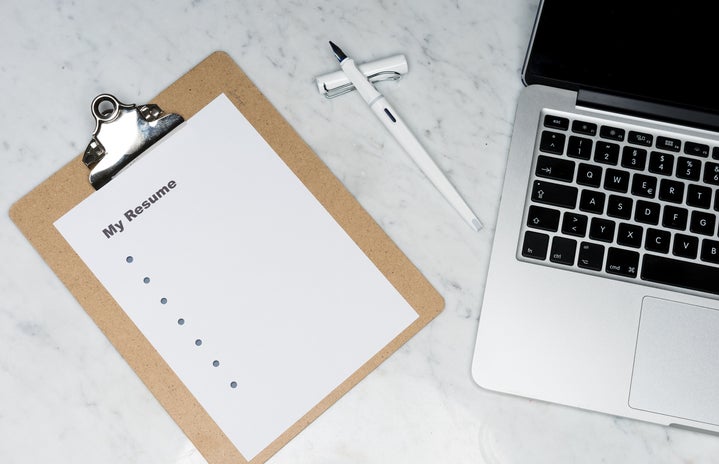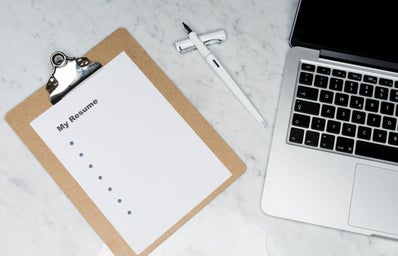We are currently in the middle of the internship season. Like many others, I have filled out numerous applications and written countless essays. One thing I’ve always felt anxious about perfecting was my resume. A resume always seems to have a cloud of confusion and mystery surrounding it for job seekers, however, it doesn’t necessarily have to be tricky. There is no single answer to what makes a resume effective. What works in one industry does not necessarily work in another. After countless workshops, critiques, and applications, here are some of my tips to help market yourself and stand out from the pile.
1. Don’t Over-Complicate Things
All a resume truly needs is four to five sections such as qualifications, education, work experience, and technical skills or additional skills and activities. Unless you’re in the creative field, forget about fancy fonts or clever uses of italics. Your resume is not meant to be a work of art to be displayed on the wall. Not only can it be hard to read, but there are multiple scanning software programs that might be unable to read it, meaning it will end up being deleted before even being opened.
2. Make it Targeted
It is important you tailor each resume to each job/internship. Doing so will really only take you a couple of sentences. The more targeted your resume is, the better you have at landing an interview. You want to make sure that you match the skills you list to the ones your potential employer is looking for.
3. Self-Promote
Do not be scared to sell your skills, accomplishments, and abilities. If you don’t tell the employer, no one else will. Include specific details about what you achieved in former roles using power words like, ‘launched’, ‘influenced’, ‘increased/decreased.’ Your resume is like a marketing document. You want to focus on what you can offer, not the other way around. Emphasize your skills, especially the ones the job is asking for. An employer wants to know you have the relevant skills for that particular job. You want the employer to glance over your resume and want to read more.
4. Be Consistent
It’s important to make sure that you write your resume in a logical and easy-to-read way. Be consistent throughout your resume with your margins, fonts, and line spacing. Don’t be afraid to highlight your skills or achievements with a different style of font. Just remember to keep it simple and not overcomplicate things. Consistency conveys professionalism.
5. Name-Drop
In real life, you don’t typically name-drop, however, you should absolutely do it on your resume. If you’ve worked with well-known companies or universities, go ahead and include them by name. Something like: “Interned with [company]” or “Conducted research with [Institution]” will get recruiters’ attention.
6. Quality over Quantity
It’s best not to list skills that most people have or use on their resumes. It can appear as if you’re just trying to fill up space on a page. Only include impactful skills that are relevant to what you’re applying for.
7. Use Your Hobbies
It’s worth including hobbies that showcase positive traits and a unique personality that could benefit you. For example, on my resume, I include that I teach drawing classes at an elementary school as a hobby. It showcases creativity and patience. The hobbies you include will cast you in the best possible light and might pique a recruiter’s interest.
8. Be Wary of Social Media
It’s becoming more common to include your social media handles on your resume. However, I think it’s more important to only include professional accounts. It can be tempting to feel the need to show employers who you are, but I advise saving your personality for the interview process instead.
9. Don’t Include Your Address Unless It’s Necessary
Unless you’re applying for internships or jobs that are in a different area from where you live, it’s best not to include your address. Recruiters are sometimes less excited to interview candidates from another city or state since they often require travel stipends. If you’re applying for an internship I would recommend putting your university name instead of your address.
10. Log Your Accomplishments
Keeping a log of your accomplishments and positive feedback as they come up can make putting together or updating your resume significantly easier. Include as many details as possible so you don’t have to spend time looking for them later.
Whether you’re applying for jobs and internships now or in the fall, keep these tips in mind. The last thing you want is for employers to pass up your resume because of wrong formatting or lack of keywords. You’re a more than capable applicant so it’s only right you demonstrate that on your resume. Once your resume is polished and finalized, it should help you get more callbacks, interviews, and job offers.



